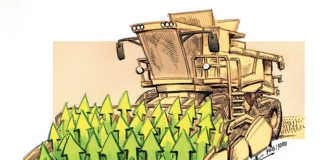
With land expropriation without compensation set to become a reality and a defining feature of South Africa’s land reform trajectory beyond 2019, its implementation is expected to enable fundamental transformation across the entire agricultural value chain, from primary to secondary agriculture and even at tertiary level.
It would not be enough to merely transfer agricultural land without radically altering the balance of forces in both the agro-business and retail supply value chains.
A successful land reform programme should bring about patterns of economic participation and empowerment across the agriculture sector that enable marginalised groups to increase the size of their farms, resulting in their ability to farm on a sustainable scale.
If this implementation does not result in meaningful economic transformation and participation, it will indeed be meaningless. South Africa’s agro-food market landscape has grown, but black producers have been excluded from the sector.
This skew towards large producers has been the norm in the sector for many years. Therefore, any discussion of fundamental transformation within the agro-food or business value chain must consider this current reality.
This is something that the Agricultural Policy Action Plan (APAP) is grappling with, and it is calling on all actors in the sector to intervene.
Challenges facing smallholders
In appraising the main challenges facing small commercial producers in the agro-business sector, the APAP notes the following:
“Poor access to appropriate and timely information led to many struggling smaller commercial businesses in the sector being bought out by bigger corporates. The entry of large retail supermarket chains into smaller rural towns has largely replaced the role of small-scale farmers as local food producers.
“Secondly, the procurement requirements of many supermarket chains and agribusinesses are too heavy for the smallholder to comply with because of the numerous and onerous standards, such as food quality and safety. As a result, smallholder farmers cannot benefit from market access opportunities offered by these agro-food chains […]”
The status quo in the agro-food value chain should compel us to look at this matter holistically, through the lens of the various policy instruments that exist.
Undoubtedly, the agriculture sector is fraught with structural fault lines constraining its growth and transformation. Inadvertently, these structural constraints undermine government’s efforts to fundamentally transform the sector.
More importantly, the challenges facing black producers in the agribusiness sector cannot be left unattended, neither can we afford to skirt around them.
A lack of market access
The first thing the sector must discourage, if not condemn outright, is that large retail supermarket chains dominate the market, at the expense of black producers. Two of the major constraints these small producers face are active participation in the agro-processing value chain and market access.
The recent Oxfam report, ‘Ripe for change: ending human suffering in supermarket supply chain’, highlights similar challenges facing small producers across the globe that are no different from those experienced by black producers in South Africa.
The report exposes the extent to which the supermarket value chain, which is largely dominated by multinational corporations, continues to build profits on the back of low wages, insecurity and inequality.
Big retail companies in South Africa, especially in the fresh produce sector, squeeze the smaller fresh produce producers out of the market.
They are often paid very low prices by retailers, who adopt the attitude of ‘take it or leave it’, leaving black producers with their back against the proverbial wall.
The produce from these black producers struggles to penetrate the markets across all commodities.
While much has already been said from various quarters of society during the ongoing public participation process involving land expropriation without compensation, representation from some players, including South Africa’s large retailers, has seemingly been minimal.
Do these business owners understand the true potential of black producers across the country? How do we provide them with the insights gained by many black producers into the informal markets, and used successfully to survive?
Any hopes of influencing traditional value chains in favour of small-scale and black producers will be dashed in the absence of the participation of those who ultimately own these value chains.
Agri transformation
A renewed or redefined land reform landscape should go hand-in-hand with agricultural transformation. Having huge tracts of land without access to the markets will just be a hollow dream.
The implementation of policies that give effect to land expropriation without compensation will have to serve as a trigger for holistic agricultural transformation of the entire value chain, from the farm gate to the supermarket aisles.
It is therefore incumbent on all industry role players to create a more inclusive agricultural value chain that fosters greater participation of the most marginalised groups looking to make a contribution to the sector
The views expressed in our weekly opinion piece do not necessarily reflect those of Farmer’s Weekly.
Zamikhaya Maseti is a senior specialist for public and sector policy at the Land Bank. He writes in his personal capacity and the views expressed in this article are his own and do not necessarily represent the policy positions of the Land Bank. Email him at [email protected].









